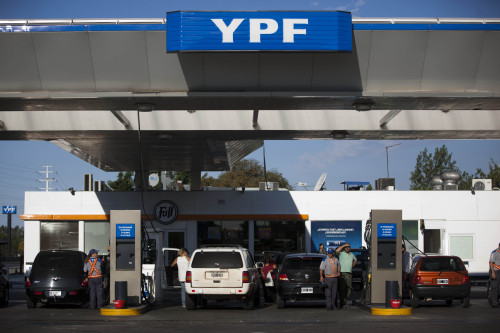BUENOS AIRES (AFP) ― Argentina said Monday it would take over a 51 percent stake in the country’s biggest oil company, YPF, owned by Spain’s Repsol, provoking an angry response from Madrid.
The move was announced to applause at a meeting between President Cristina Kirchner and her cabinet and Argentine governors, and came despite warnings from Madrid and EU officials.
Reading a statement at the meeting, an official said YPF-Repsol “is declared a public utility and subject to expropriation of 51 percent of its assets.”
The stake will then be split up between the Buenos Aires government which will get 51 percent of those shares, and the oil-producing states, which will get the remaining 49 percent.
Spain denounced the “hostile” move and warned that it would take “clear and forceful measures” in response.
Argentina’s decision had “broken the climate of friendship” between the two countries, said Foreign Minister Jose Manuel Garcia Margallo, speaking after a crisis cabinet meeting called by Prime Minister Mariano Rajoy.
 |
People refuel their vehicles at a YPF gas station in Buenos Aires, Argentina, Monday. (AP-Yonhap News) |
“It’s a hostile decision against Repsol, thus against a Spanish business, and thus against Spain,” said Industry Minister Jose Manuel Soria, speaking at the same news conference.
“The government is announcing that it will take all the measures it considers appropriate to defend the legitimate interests of Repsol and of all Spanish businesses abroad,” he added.
Kirchner said she would not be intimidated by what she called threats made in recent days from EU and Spanish officials.
“This president will not respond to threats,” she said. “I am a head of state, not a vegetable merchant. All companies present here, even if the shareholders are overseas, are Argentine companies.”
Spain and the European Union last week warned that Argentina would damage relations with them if it went ahead and nationalized YPF.
YPF oil concessions had previously been revoked by 16 provinces, on grounds that the company was not meeting its investment obligations.
Kirchner has pressured oil companies operating in Argentina to increase production, after the country’s bill for oil imports shot up 110 percent last year to $9.4 billion.
The president sent a bill to Congress, which was expected to approve the measure to take over YPF. It would call for a special tribunal to establish the price to paid to the shareholders including Repsol.
“We are not going to have a nationalization. We are going to have a recovery” of the company, which had been state-controlled until 1999, Kirchner said.
The president said the group would operate “as a corporation, with professional directors.”
She later named Planning Minister Julio De Vido as the government delegate to the company under an emergency order which allows the state to control the firm for 30 days.
In New York, YPF shares were suspended after plunging some 15 percent on the news. In the last trades, shares were down 11 percent at $19.50. Trading in YPF was also suspended in Buenos Aires.
Repsol bought Yacimientos Petroliferos Fiscales in 1999 for $15 billion in what was the biggest operation of the privatization program of former Argentine president Carlos Menem.
The unit remains the largest oil firm in the South American nation, as the leader in fuel sales and 54 percent of refining capacity.
But the Argentine government had been increasingly critical of lower investment by YPF which meant a drop in production of oil and gas and higher import costs.
On Sunday, Repsol chairman Antonio Brufau urged Argentina’s government to sit down and talk about the issue.
“One has to talk, to talk, not impose or go around making remarks for politics’ sake. Things have to be taken care of in the office, and by talking.
People bridge their differences by talking,” he told Radio Mitre.
He has been in Buenos Aires since last week trying to get negotiations started on the issue.








